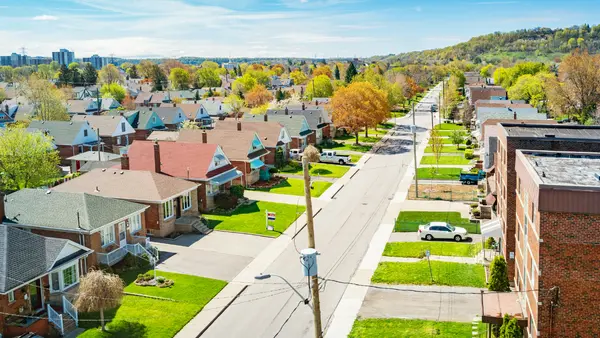Canadian Cities with Declining Home Prices in 2025: A Comprehensive Overview
As we progress through 2025, Canada’s housing market is exhibiting varied trends across different regions. While national forecasts suggest modest price increases fueled by lower interest rates and renewed buyer activity, certain cities are experiencing notable declines in home prices. This article delves into these cities, exploring the factors contributing to the downturns and what prospective buyers and investors should consider.
1. Lloydminster, Saskatchewan
Lloydminster has witnessed a significant 34.2% drop in home prices, decreasing from $260,000 in December 2023 to $171,180 in December 2024. This substantial decline makes it one of the most affected markets in Canada. The affordability factor is notable, with an annual gross income of approximately $48,000 sufficient to purchase an average-priced home in the area.
2. Alberta West, Alberta
Encompassing regions like Hinton, Jasper, and Banff, Alberta West has experienced a 21.7% decrease in home prices, from $494,186 to $387,001. The downturn is attributed to factors such as reduced demand and economic shifts. Prospective buyers would need an annual income of around $89,000 to afford a home here.
3. Sarnia-Lambton, Ontario
In Sarnia-Lambton, home prices have declined by 12.7%, dropping from $564,607 to $493,103. This decrease reflects broader trends in Ontario’s housing market, influenced by factors like high borrowing costs and market corrections. An annual income of approximately $113,000 is required to purchase an average-priced home in this region.
4. Portage la Prairie, Manitoba
Portage la Prairie has seen a 7.9% reduction in home prices, from $247,500 to $228,000. This decline presents opportunities for buyers, especially those with an annual income of about $54,000, to enter the housing market in this area.

5. Bancroft and Area, Ontario
The Bancroft region has experienced a 6% decrease in home prices, from $547,900 to $514,800. Despite the decline, the area remains relatively less affordable, requiring an annual income of approximately $118,000 to purchase an average-priced home.
Honourable Mentions: Other Cities with Declining Prices
Several other Canadian cities have reported year-over-year declines in home prices:
Brandon, Manitoba: -5.3%
Fort McMurray, Alberta: -4.5%
Simcoe and District, Ontario: -4.3%
Swift Current, Saskatchewan: -4%
Quinte and District, Ontario: -3.4%
Medicine Hat, Alberta: -2.7%
Fraser Valley, British Columbia: -2%
Tillsonburg District, Ontario: -1.2%
Cape Breton, Nova Scotia: -1.1%
York Region, Ontario: -0.8%
Several elements are influencing the downward trend in these cities:
Economic Uncertainty: Fluctuating economic conditions, including trade tensions and employment concerns, have impacted buyer confidence.
Interest Rates: While the Bank of Canada has implemented rate cuts, the effects on affordability and buyer activity vary across regions.
Supply and Demand Dynamics: Increased housing supply in certain areas, coupled with subdued demand, has exerted downward pressure on prices.
Despite regional declines, national forecasts suggest a modest rebound in home prices:
Royal LePage predicts a 6% increase in the average home price in Canada for 2025, attributing this to declining interest rates and a renewed interest from buyers.
Canadian Real Estate Association (CREA) forecasts a 4.7% rise in average home prices, driven by pent-up demand and easing mortgage rates.
Implications for Buyers and Investors
For prospective buyers:
Opportunities: Cities with declining prices may offer more affordable entry points into the housing market.
Caution: It’s essential to assess local economic conditions and long-term prospects before making a purchase.
For investors:
Strategic Investments: Declining markets may present opportunities for long-term investments, especially if the broader national trend moves towards recovery.
While Canada’s housing market shows signs of stabilization and modest growth nationally, certain cities are experiencing notable declines in home prices. Understanding the local factors that contribute to these trends is crucial for buyers and investors who aim to make informed decisions in 2025. Contact us for a Mortgage agent in Vaughan.
